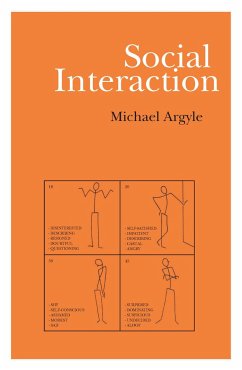
Social Interaction
Process and Products
Versandkostenfrei!
Versandfertig in 6-10 Tagen
44,99 €
inkl. MwSt.
Weitere Ausgaben:

PAYBACK Punkte
22 °P sammeln!
Reflecting the many contributions of Muzafer Sherif to social psychology during the past thirty years, this volume presents selections from among Sherif's most widely known essays and provides a systematic overview of his evolving interests, concepts, methods and research findings. Twenty-five essays are divided into five sections according to content; the theoretical and methodological problems at the heart of Sherif's work; the experimental model for interaction process and products; problems of self and reference groups; concepts, attitudes and ego-involvements; and contributions to problem...
Reflecting the many contributions of Muzafer Sherif to social psychology during the past thirty years, this volume presents selections from among Sherif's most widely known essays and provides a systematic overview of his evolving interests, concepts, methods and research findings. Twenty-five essays are divided into five sections according to content; the theoretical and methodological problems at the heart of Sherif's work; the experimental model for interaction process and products; problems of self and reference groups; concepts, attitudes and ego-involvements; and contributions to problems of in-group and intergroup relations through experimental and field research. Though the selections range over a broad spectrum each is characterized by the precise and incisive work techniques Sherif devised as well as by its intrinsic relevance to significant issues. Sherif writes to clarify theory, to define conceptual tools, and to use tools and theory to demonstrate the substantive results of his researches. Each research finding is added to its predecessors as the author advances to his goal of a social psychology that is consistent as it moves from the most basic psychological processes to the complexities of individual involvement in collective activity














